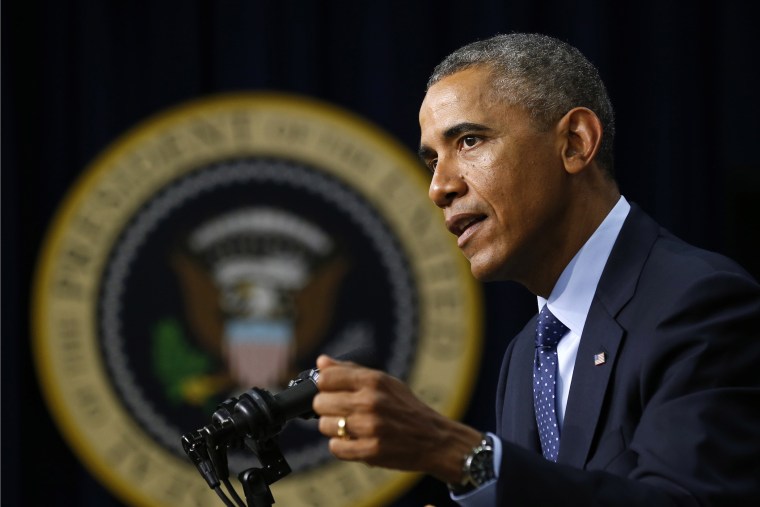Republicans are jumping on President Barack Obama’s blunt admission that American officials “underestimated” the threat ISIS posed, arguing that the White House is trying to evade responsibility for broader policy mistakes.
"I think our head of the intelligence community, Jim Clapper, has acknowledged that I think they underestimated what had been taking place in Syria,” Obama said in an interview with CBS’s 60 Minutes. The president added that it was “absolutely true” that the U.S.-trained Iraqi forces had failed to live up to expectations.
A number of prominent Republican politicians on Monday accused Obama of passing the buck to America’s intelligence community rather than accepting blame for what they see as a failure at the top to adequately prepare for potential dangers in Iraq and Syria.
In Wisconsin, New Jersey Gov. Chris Christie and Wisconsin Gov. Scott Walker both criticized the president's approach to fighting the Islamic State.
"He used the pronoun, 'they,' as if he was somehow detached from the people who worked for his administration," Christie said when asked about the president's comments about intelligence officials.
"I think the single biggest difference between the kind of leadership that Scott [Walker] has shown here in Wisconsin, I've tried to show in New Jersey, and [the leadership] that the president is displaying in Washington is when something goes wrong he's, you know, now saying it's 'they,' somehow, who underestimated. And the fact is he's the president of the United States, he has the responsibility for keeping our country safe," Christie added.
Unmentioned was Christie's frequent use of the word "they" to describe his own issues with staffers in his administration who were involved in Bridgegate, the scandal surrounding the closure of the George Washington Bridge in September of last year. ("I am embarrassed and humiliated by the conduct of some of the people on my team. There's no doubt in my mind that the conduct that they exhibited is completely unacceptable and showed a lack of respect for their appropriate role of government and for the people that we're trusted to serve," Christie said in January.)
Walker, for his part, said he didn't believe the president had a complete plan to fight ISIS.
"I hear a nation's commander in chief making comments about what we may or may not do without feeling comfortable that we have a game plan," Walker said. "It concerns me for those men and women who serve in the Wisconsin National Guard."
Critics cited interviews and testimony from prominent military and State Department officials as evidence the president had sufficient intelligence at his disposal. House Intelligence Chairman MIke Rogers, who sponsored a resolution in 2013 calling for military aid to moderate Syrian rebels on the basis that "the prolongation of fighting in Syria is likely to enhance the strength of religious extremist forces," issued a blistering statement arguing that a lack of early action against ISIS "was not an Intelligence Community failure, but a failure by policy makers to confront the threat."
Congressman Peter King of New York pointed to testimony from Lieutenant General Michael Flynn, the former director of the Defense Intelligence Agency, who said in a February Senate hearing that the Islamic State “probably will attempt to take territory in Iraq and Syria to exhibit its strength in 2014, as demonstrated recently in Ramadi and Fallujah, and the group’s ability to concurrently maintain multiple safe havens in Syria.”
"The fact is the president dropped the ball,” King said in an appearance on msnbc on Monday. “He dropped it two years ago in Syria, he dropped it over the last 14 months with ISIS, and now he's trying to blame everyone but himself.”
Sen. John McCain said Monday that "we predicted this and watched it. It was like watching a train wreck and warning every step of the way that this was happening."
Matt Wolking, a communications adviser to Speaker Boehner, also unsurprisingly had harsh words for the president. “Never underestimate President Obama’s ability to avoid taking responsibility,” he wrote in a blog post. “Under fire for being out to lunch while the Islamic State of Iraq and the Levant (ISIL, also known as ISIS) was taking over large swaths of the Middle East, the president is hoping that if he blames faulty intelligence estimates often enough, no one will notice just how incompetent his foreign policy prowess has proved.”
White House Press Secretary Josh Earnest told reporters that Obama’s remarks were not meant to deflect criticism.
“On questions like this that the president has answered in the past, he's been very clear that as commander in chief he is the one who is personally responsible,” he said. He added that the president “has confidence in the intelligence professionals who are responsible for providing him advice and intelligence about what is happening on the ground.”
Pressed by a reporter as to whether intelligence officials should be held accountable if they had, in fact, failed to see Iraq’s vulnerability to ISIS on the horizon, Earnest responded that “predicting the will of foreign security forces to fight for their country is difficult.”
Correction: A previous version of this story attributed a statement to Congressman Hal Rogers instead of Congressman Mike Rogers. Msnbc regrets. the error.
Kasie Hunt contributed to this report from Hudson, Wisconsin.
